Donor families, transplant patients share legacies of life
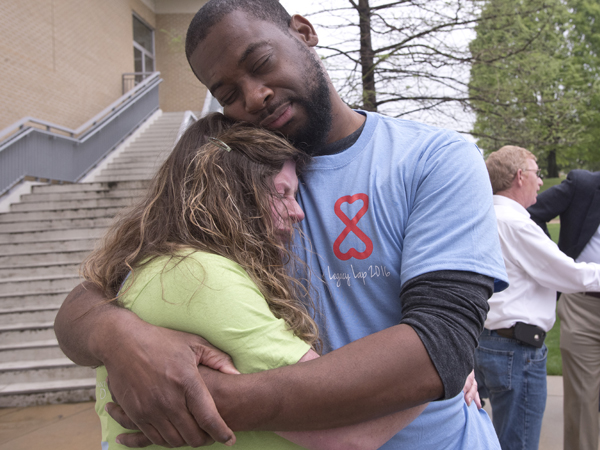
Sept. 15, 2014.
It was the day that 18-year-old Gabriel Jordan of Tupelo died. It was the day that Pearl resident Sam Walker received a kidney and pancreas transplant at the University of Mississippi Medical Center.
Gabriel's mom, Christine Jordan, and 44-year-old Walker discovered their common bond during a chance conversation on Friday as they took part in the Legacy Lap, a gathering for transplant recipients and donor families in the Norman C. Nelson Student Union.
Through her tears, Jordan raised Walker's T-shirt to examine the scar on his abdomen, which now shelters her son's organs. They hugged as Walker, at 6 foot 3, towered over her, just as 6-foot-3 Gabriel did before a years-long struggle with depression led to his suicide at his father's gravesite in Kosciusko.
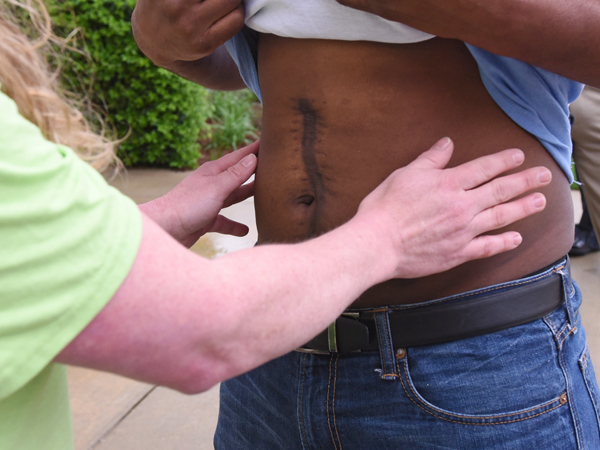
If not for Jordan's generosity and that of other families whose loved ones died this year, 47 people in Mississippi and surrounding states wouldn't have received life-saving organ transplants at the Medical Center.
There's joy in receiving an organ, and for many donor families, comfort in the knowledge that the gift of life from their loved one is inspiring others to do the same. It was a sentiment expressed over and over at the Legacy Lap hosted by the Mississippi Organ Recovery Agency, the Medical Center's transplant teams and the University Transplant Guild. Held during National Donate Life Month, the event promotes the need for organ donations in Mississippi.
Since January, the work of MORA and the state's only transplant program has made possible 30 kidney transplants, 11 liver, three heart and three pancreas. “You somehow found in your hearts the ability to give a gift to someone you've never met,” Kevin Stump, MORA's chief executive officer, told the crowd.
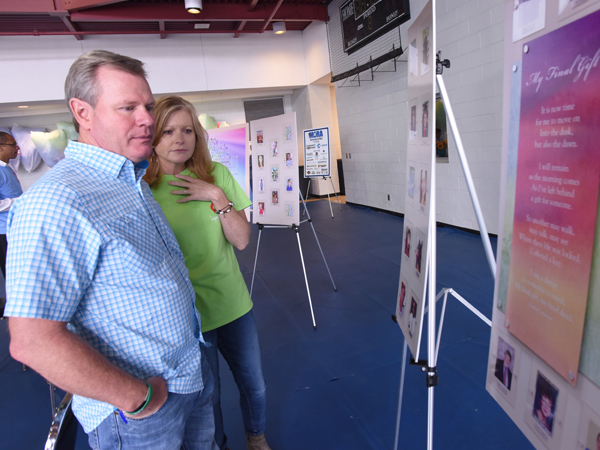
Last year's Legacy Lap was where David Wilbanks of Jackson, father of the late Walker Wilbanks, first saw Sarah Thornbury, the 33-year-old Alabama woman who received his son's pancreas and one of his kidneys. The younger Wilbanks, a Jackson Preparatory School athlete, died in August 2014 after falling ill at a football game. Walker suffered a brain seizure, Wilbanks said at this year's Legacy Lap.
“When I hugged her, knowing that a part of Walker was with her, I felt Walker's presence. It was amazing to see how grateful Sarah and her family were for Walker's gift,” Wilbanks said. “It was so awesome to tell them Walker stories, and to hear their stories.”
When David and Sheila Wilbanks made the decision to donate their son's organs, “we left saying, 'Right, Walker's organs saved five people.' But he really saved five families. He saved five generations,” Wilbanks said Friday.
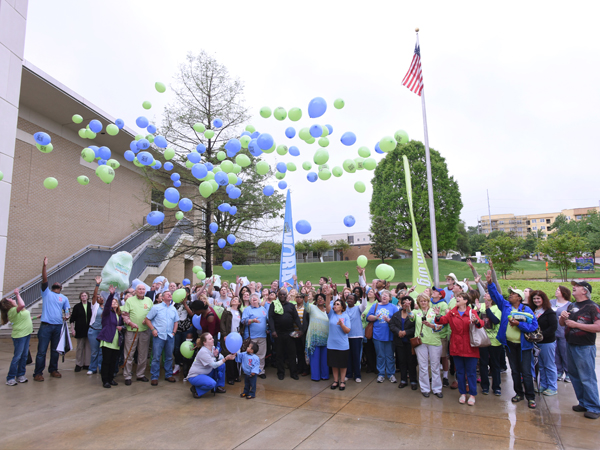
Just minutes before a balloon launch to end Friday's Legacy Lap, Jordan spotted Sam Walker in the Student Union. “I kept looking at him,” Jordan said. “I was sitting in the front, and he was in the back.”
She caught up with him as the crowd walked outside. “I asked him if he was a recipient. He said kidney and pancreas,” Jordan said. “I asked him his surgery date. He said Sept. 15, 2014. Then, he asked me: 'Are you Gabe's mom?'”
She'd written letters to each person who received one of Gabe's organs, giving them to MORA for delivery to the recipients. Instead of writing back, Walker told Jordan, he wanted to come to the Legacy Lap in hopes of finding her.
“This is better than a letter,” Jordan told him.
Gabe had suffered from depression since his dad died when Gabe was 9, Jordan said. She rescued him from a failed suicide attempt when he was 13. Two days before Gabe died, she found a video he made, “explaining why he did what he did. He told me to stay in (nurse practitioner) school, and how much he loved me and that it wasn't my fault. When I talked to him about it, he lied about when he made it and said that he was fine. I believed him,” his mom said.
The night before he died, Gabe wouldn't answer his mother's calls. She didn't know where he was. “I knew he was going to complete it,” she said.
And as her son lay in the ICU, “I told them I wanted him to be an organ donor.” She purchased hyssop, myrrh and frankincense - “they were the oils given to Jesus” - and crawled into Gabe's bed.
“All night long, I anointed him with the oils, from head to toe,” Jordan said, showing Walker by lightly touching his chest on his heart, liver and the scar from his transplant. “I prayed for each organ to be good, and for God to pick out who would get them,” she told him.
His kidneys nearing complete failure despite dialysis, Walker was placed on a transplant list less than two weeks before he got the call. “It was quick. I was a little scared.”
It made his 20-plus years as a Type 1 diabetic history. “It's a whole new world for me. It's a blessing,” he told Jordan.
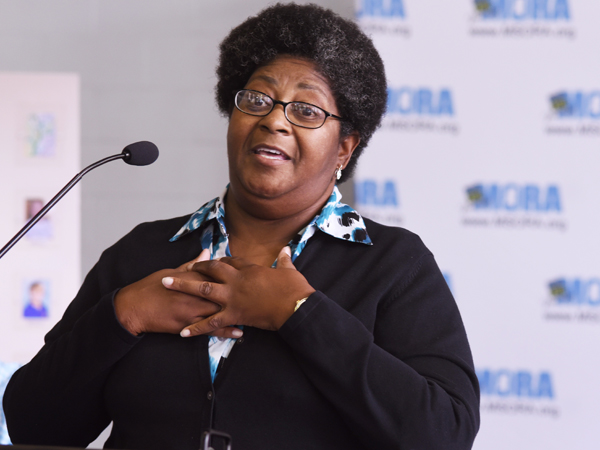
Moseziner “Moe” Crozier of Byram told the Legacy Lap gathering that she received the heart of 28-year-old Kris Haywood at the Medical Center in March 2015.
“It was a life-changer for me,” the 53-year-old said. “One day you're dying, and the next day you are reborn. I can't really describe how you can go from preparing your family for your own death - preparing them for the inevitable - and then getting up and walking down the hall by yourself.”
During 2015, 90 people received a kidney transplant at UMMC in addition to six pancreas, 29 liver and 13 heart transplants. Nearly 1,500 Mississippians need a transplant, as do more than 121,000 nationally. Every day, 27 people in the United States die waiting for an organ, and someone joins the national organ waiting list every 10 minutes.
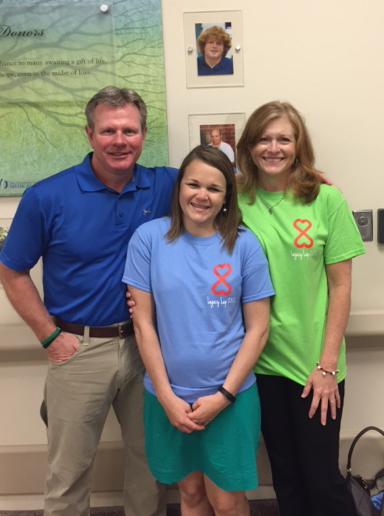
David Wilbanks said his family became acquainted with Thornbury because of a chance meeting in January 2015 between the grandmother of Jake Mangum, one of Walker Wilbanks' baseball teammates, and the mother of Thornbury.
“Jake's grandmother was at a store in Gulf Shores where Sarah's mom works. They struck up a conversation, and during the conversation put two and two together,” Wilbanks said. “Sarah's mom had been with her in Jackson on August 26 for Sarah's organ transplant.”
It was the same time as news reports of Walker's death just the day before.
'I couldn't put into words how I felt toward them,” said Thornbury, who with husband Donald has two children. The families planned to meet up at the 2015 Legacy Lap, but before they found each other in the crowd, Thornbury had to run after her then-1-year-old as he crawled away from her. She felt a tap on her shoulder. It was Sheila Wilbanks.
“She recognized me because I had on the blue recipient T-shirt, and she knew I had a small son,” Thornbury said. “The bond we had, even though we'd never met, was truly amazing.”
Dr. Christopher Anderson, professor and chairman of the Department of Surgery, asked Legacy Lap participants to spread the word about organ donation. “I have the best job of anyone. I'm a transplant surgeon,” he said. “I'm humbled every time I get to participate in those operations.”
“A lot of people say, 'Oh, me donating my organs won't help Mississippi,'” Crozier said. “But it does. It may be someone in your own back yard who donates an organ to you, or that you donate to. You are helping your own.”


